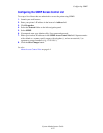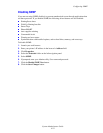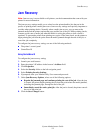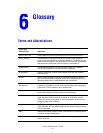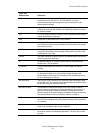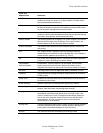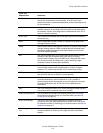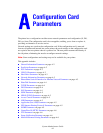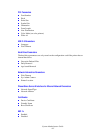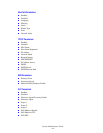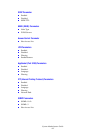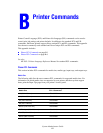
Terms and Abbreviations
System Administrator Guide
6-4
RADIUS Radius (Remote Authentication Dial In User Service) is a server used for
remote user authentication and accounting. It can be used on any
network that needs a centralized authentication and/or accounting service
for its workstations.
SLP SLP (Service Location Protocol) is a protocol that provides a flexible and
scalable framework for providing hosts with access to information about
the existence, location, and configuration of networked services. SLP is
useful in enterprise networks.
Smart Trays A driver feature that displays the current paper type and size available in
each printer tray.
SMTP SMTP (Simple Mail Transfer Protocol) is a protocol for sending e-mail
messages between servers.
SNMP SNMP (Simple Network Management Protocol) is a protocol used to help
manage complex networks. SNMP-compliant devices store data about
themselves in MIBs (Management Information Bases) and return this
data to the SNMP requestors.
SSL SSL (Secure Socket Layer) is a protocol that has become the universal
standard on the Web for authenticating sites and for encrypting
communications between users and Web servers. Because SSL is built
into all major browsers and Web servers, simply installing a digital
certificate or Server ID enable SSL capabilities.
TCP/IP TCP/IP (Transmission Control Protocol/Internet Protocol) is a set of
communication protocols that is supported by a variety of computer
platforms. TCP controls data transfer, and IP controls data routing.
TFTP TFTP (Trivial File Transfer Protocol) is a version of the TC/IP FTP protocol
that uses UDP and has no directory or pass capability.
TLS TLS (Transport Layer Security) is a protocol for establishing a secure
connection between the client and the server. TLS is capable of
authenticating both the client and the server and creating an encrypted
connection between the two. HTTP uses TLS to establish secure
connections.
UDP UDP (User Datagram Protocol) is a minimal message-oriented transport
layer protocol found on domain name servers (DNS).
Walk-Up Printing Driver The Xerox Walk-Up Printing Driver enables printing from a PC to any
Xerox Postscript-enabled printer. For more information, see Walk-Up
Printing Driver on page 2-3.
Walk-Up Technology The Xerox Print Driver Installer (Windows) is a software utility that
provides for quick and easy installation of the printer driver. One choice
for installation is Walk-Up Technology. For more information, see Walk-Up
Installation on page 2-3.
Xerox Usage Analysis
To ol
The Xerox Usage Analysis Tool enables you to collect and analyze
enterprise-wide Xerox network printer usage data with customizable
features.
Terms and
Abbreviations Definitions



